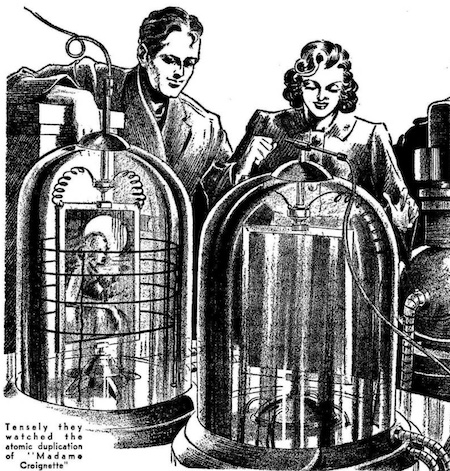Science Fiction
Dictionary
A B C D E F G H I J K L M N O P Q R S T U V W X Y Z
Latest By
Category:
Armor
Artificial
Intelligence
Biology
Clothing
Communication
Computers
Culture
Data Storage
Displays
Engineering
Entertainment
Food
Input Devices
Lifestyle
Living Space
Manufacturing
Material
Media
Medical
Miscellaneous
Robotics
Security
Space Tech
Spacecraft
Surveillance
Transportation
Travel
Vehicle
Virtual
Person
Warfare
Weapon
Work
"Conspiracy theories are big because they're comforting. Any conspiracy is infinitely less multiplex than the real deal, which is multiplex to the point of being unknowable."
- William Gibson
| Duplication Chamber | ||
| A means of precisely duplicating an object. |
Very early description of this idea.
| The quartz window, through which the three were looking, was set in a tall metal container, and just a few feet away was another container, identical even to the thickness of the windowglass.
Overhead was a complex assemblage of apparatus: bulbous, silvered tubes, small electric motors that hummed in various unexpected places, makeshift screens of zinc, roughly soldered, coils upon coils of wire, and a network of slung cables that made the place look like a creeper-tangled tropical jungle. A large dynamo churned out a steady roar in the corner, and a pair of wide sparkgaps crackled continuously, filling the laboratory with a weird, jumping blue light as the day waned outside the windows and the dusk crept in.
 (Duplication chamber from 'The 4-Sided Triangle' by William F. Temple) An intruder in the laboratory might have looked through the window of the other container and seen, standing on a steel frame in a cubical chamber, an oil painting of “Madame Croignette” by Boucher, delicately illuminated by concealed lights. He would not have known it, but the painting was standing in a vacuum. If he had squeezed behind the trio at the other container and gazed through their window he would have seen an apparently identical sight: an oil painting of “Madame Croignette” by Boucher, standing on a steel frame in a vacuum, delicately illuminated by concealed lights. From which he would probably not gather much. The catch was that the painting at which the three were gazing so intently was not quite the same as the one in the first container — not yet. There were minute differences in color and proportion. But gradually these differences were righting themselves, for the whole of the second canvas was being built up atom by atom, molecule by molecule, into an exactly identical twin of the one which had felt the brush of Francois Boucher. "THE marvelously intricate apparatus, using an adaption of a newlydiscovered magnetic principle, consumed only a moderate amount of power in arranging the lines of sympathetic fields of force which brought every proton into position and every electron into its respective balancing orbit. It was a machine which could divert the flow of great forces without the ability to tap their energy. |
| Technovelgy from The 4-Sided Triangle,
by William F. Temple. Published by Amazing Stories in 1939 Additional resources -
|
The final effort to create a living person:
The last pages were about the experiment of creating another Joan, and the last recognizable entry read:
“This clumsy business of pumping through pipes, in the manner of a blood transfusion, left a small scar at the base of Doll’s neck, the only flaw in an otherwise perfect copy of Joan. I resented. . . .”
The rest was burned away.
They were written in Bill’s system of shorthand, which Will understood. The first two were old, and of no particular interest. The last, however — unfortunately the most badly charred of the three — was an account of Bill’s attempts to infuse life into his replicas of living creatures.
Comment/Join this discussion ( 0 ) | RSS/XML | Blog This |
Additional
resources:
More Ideas
and Technology from The 4-Sided Triangle
More Ideas
and Technology by William F. Temple
Tech news articles related to The 4-Sided Triangle
Tech news articles related to works by William F. Temple
| Can One Robot Do Many Tasks? |
| Roborock Saros Z70 Is A Robot Vacuum With An Arm |
| Secret Kill Switch Found In Yutong Buses |
| The Desert Ship Sailed In Imagination |
Want to Contribute an
Item?
It's easy:
Get the name of the item, a
quote, the book's name and the author's name, and Add
it here.
| <Previous | Next> |
|
|
|
Technovelgy (that's tech-novel-gee!) is devoted to the creative science inventions and ideas of sf authors. Look for the Invention Category that interests you, the Glossary, the Science Fiction Invention Timeline, or see what's New.
|
Science Fiction
Timeline
1600-1899
1900-1939
1940's 1950's
1960's 1970's
1980's 1990's
2000's 2010's
'...there's a narrow belt where the climate is moderate.'
'... with the Master-operator all you have to do is push one! A remarkable achievement!'
'Not like me. A T-1000, advanced prototype. A mimetic poly-alloy. Liquid metal.'
'It was riddled with holes that were the mouths of tunnels.'
'The massive feet working the pedals, arms and hands flashing and glinting...'
'There were cubic miles of it, and it glistened like a silvery Christmas tree...'
'Jason had been guiding the caravan of cars as usual...'
"The robot solemnly hit a ball against the wall, picked it up and teed it, hit it again, over and again...'
